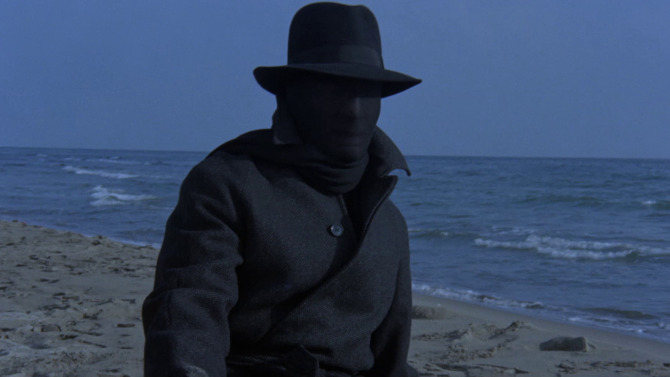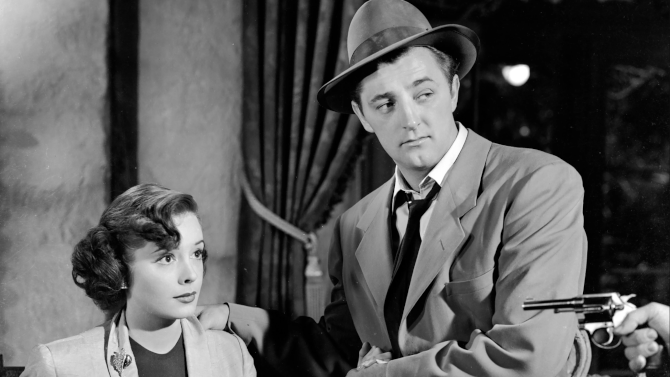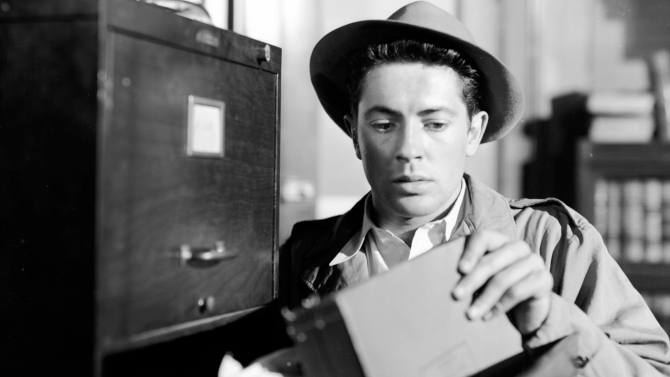
A Lawyer, a Mortician, and a Professor Walk Into a Morgue...
One of the trends of the gialli, when possible, was for the film making team to attract a formerly successful Hollywood star who had aged out of his heyday a bit... think The Pyjama Girl Case who nabbed Ray Milland, The Cat O’Nine Tails starring Karl Malden, or The Killer Is On the Phone featuring Joseph Cotten... and, with today’s example, Farley Granger leading So Sweet, So Dead (1972). Directed by Roberto Bianchi Montero, the feature, which is also known as the less subtle The Slasher ... Is the Sex Maniac! follows a small city detective, Inspector Capuana (a mustached Granger – They Live by Night; Side Street), who has recently moved to a larger locale in southern Italy.
-

Stealers Wheel
The Big StealNovember 20, 2024A film noir with some eccentricities, The Big Steal (1949), directed by then third time film maker Don Siegel (who would go on to make such greats as Invasion of the Body Snatchers, Dirty Harry, and Escape from Alcatraz), plays like a long chase within a longer chase, while the meeting between gent and femme is something akin to a will they/won’t they screwball comedy. The usually laconic Lt. Duke Halliday (Robert Mitchum) is in quite the conundrum, as he has been robbed of a U.S. Army payroll totaling a whopping three hundred grand by swindler Jim Fiske (Patric Knowles). On the lam in Mexico (a rather rare noir location, also think Ride the Pink Horse and Touch of Evil), Halliday is on his trail... but the problem is, so is his superior – Captain Vincent Blake (William Bendix), who, of course, thinks it was actually the Lieutenant who ran off with the money.
-

Easy Street?
Side StreetNovember 13, 2024Looking for the easy way out... it’s often a motif of the film noir. Taking the idea to its seemingly inevitable conclusion, director Anthony Mann (Desperate) definitely drives the concept down what seems to be every Side Street (1949) in The Big Apple in this tale of go on, take the money and run. Joe Norson (Farley Granger) is anticipating the birth of his first child with wife Ellen Norson (Cathy O’Donnell). The acting pair grace the screen together for the second and final time following They Live by Night from the previous year... funnily enough, it almost plays as a ‘what could have been’ second chance for that couple.
-

The Price is Vice
Vice RaidNovember 23, 2023With working titles such as Woman Confidential, Pleasure Girl, and The Blonde in 402, each should give you a decent idea about what 1959's Vice Raid is all about. A B-movie with some bite, director Edward L. Cahn brings scandal, racketeering, and corruption to the forefront of this late era film noir crime feature. Meet Sgt. Whitey Brandon (Richard Coogan), an officer that is akin to a dog on a bone. Desperate to get to the root of a massive prostitution ring run by best dressed mobster Vince Malone (Brad Dexter), he and partner Ben Dunton (Joseph Sullivan) seem to constantly get ohsoclose, yet so very far from getting a true lead.
-

Hell Hath No Fury Like a Woman Scorned
Hell's Half AcreNovember 15, 2023A triumvirate of friends – bosom buddies, longtime pals... and hardcore criminals – though we all know the idiom ‘as thick as thieves’, that is not always the case, for especially in film noir, friend can quickly become foe, and femme can often become fatale. Case in point – Hell’s Half Acre (1954), directed by John H. Auer. Meet Chet Chester (Wendell Corey – Rear Window), supposedly dead at Pearl Harbor, the criminal used the event to change his name (he was originally Randy Williams) and make it rich in the racketeering underworld in Hawaii (with his two buddies). Now the owner of a swank nightclub and transformed into an amateur songwriter, his past soon comes knocking when he is confronted by sketchy eyed business partner Slim Novak (Robert Costa), who is looking for another payout... and he’s not afraid to shoot for it. The problem is, Chet’s protectively dangerous dame, Sally Lee (Nancy Gates), has a just as itchy trigger finger, offing his former buddy quite quickly.
-

Triple Threats
Guns Girls and GangstersNovember 10, 2023Almost as if designed to be a scripted crime version of a PSA for the greatness of armoured trucks, Guns Girls and Gangsters (1959), directed by Edward L. Cahn, is a late era film noir that still has some bite. Voice-over narrated by the above quoted Chuck Wheeler (Gerald Mohr), he’s the hardened criminal with the plan. With a dead-eye shot that can blow out a moving tire from fifty yards and a mug to match said blown out rubber, he plans on knocking off an armoured truck carrying two million dollars.
-

Hand in Bloody Hand
Kiss the Blood Off My HandsNovember 6, 2023A man, whose five o’clock shadow (after several drinks) is seemingly approaching midnight, kills another at last call in a drunken fit; evading chasing parties, he slips through an unlocked window and gazes upon a beautiful sleeping woman – a singular moment that will forever change and intertwine their lives... this is the mysteriously alluring introduction to the film noir Kiss the Blood Off My Hands (1948), directed by Norman Foster. The man is Bill Saunders (Burt Lancaster) – an American concentration camp survivor who is grifting in and around London; the woman is Jane Wharton (Joan Fontaine) – a highly educated yet lonely nurse who lost her sweetheart during the war, together they are quite the unlikely pair.
